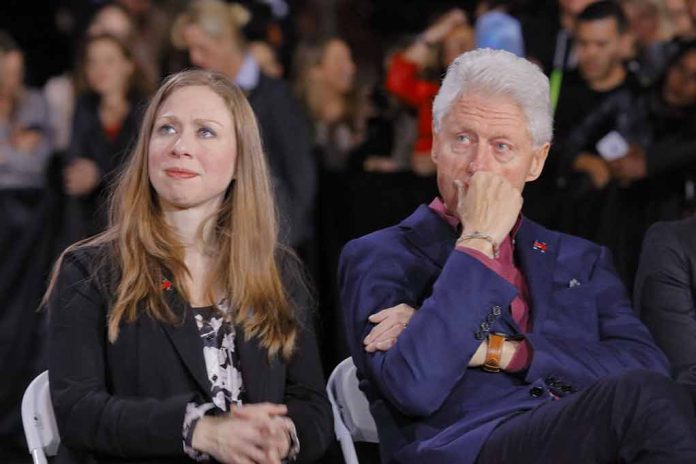
Former President Bill Clinton denies visiting Jeffrey Epstein’s private island in his new memoir “Citizen,” expressing regret over their association.
At a Glance
- Clinton denies visiting Epstein’s private island and regrets meeting him
- The memoir discusses Clinton’s association with Epstein, focusing on politics and economics
- Clinton took flights on Epstein’s private jet for Clinton Foundation trips
- Clinton claims he was unaware of Epstein’s crimes and cut off contact after learning of charges
- Epstein accuser mentioned Epstein bragging about knowing Clinton
Clinton’s Denial and Regret
In his latest memoir “Citizen,” former President Bill Clinton addresses the controversy surrounding his relationship with Jeffrey Epstein. Clinton firmly denies ever visiting Epstein’s notorious private island, Little St. James Island, and expresses deep remorse over their association. The former president’s account aims to distance himself from the disgraced financier and refute speculation about his involvement in Epstein’s illegal activities.
Clinton’s memoir provides a detailed explanation of his encounters with Epstein, emphasizing that their interactions were primarily related to his post-presidential philanthropic work. He states that his use of Epstein’s private jet was strictly for Clinton Foundation trips, attempting to frame their relationship as purely professional.
Bill Clinton denies visiting Jeffrey Epstein’s private island in upcoming memoir: ‘Wish I had never met him’ https://t.co/jmwlBMTB5h pic.twitter.com/xPiJKf26oA
— New York Post (@nypost) November 16, 2024
Professional Encounters and Foundation Work
According to Clinton, he met Epstein in New York after leaving the White House, with encounters occurring once in Harlem and once at Epstein’s mansion. The former president maintains that their discussions were limited to constructive political and economic matters. Clinton’s account portrays these meetings as part of his broader engagement with various individuals in pursuit of his foundation’s goals.
The memoir emphasizes Clinton’s post-presidential philanthropic endeavors, framing his encounters with Epstein within this context. By doing so, Clinton attempts to separate his legitimate foundation work from the scandal surrounding Epstein’s criminal activities.
Allegations and Legal Implications
While Clinton’s name has appeared in court documents related to Epstein’s associate Ghislaine Maxwell, it’s important to note that he has not been accused of any crimes. However, the association has led to ongoing speculation and scrutiny. An Epstein accuser, Johanna Sjoberg, mentioned in her testimony that Epstein had bragged about knowing Clinton and made a comment about Clinton liking young girls.
Clinton’s spokesperson has consistently denied any personal relationship with Epstein, echoing the former president’s assertions in the memoir. Clinton maintains that he was unaware of Epstein’s crimes and immediately cut off contact after learning of the charges in Florida. This stance aligns with his overall narrative of limited, professional interactions with Epstein.
Epstein’s Legal Troubles and Death
The context of Clinton’s memoir revelations is crucial. Epstein faced federal sex trafficking charges in 2019 and died in jail while awaiting trial. This came after a previous, controversially lenient sentence in 2008. The ongoing investigations and revelations about Epstein’s activities have continued to draw attention to his past associations, including those with prominent figures like Clinton.
Clinton’s memoir serves as his most comprehensive public statement on his relationship with Epstein to date. By addressing the issue directly, the former president aims to clarify his position and put to rest any lingering questions about his involvement. However, given the high-profile nature of both Clinton and Epstein, it’s likely that public interest in their association will continue.
Sources:
Bill Clinton denies visiting Epstein island in new memoir and wishes he ‘had never met him’













